Marketed as filling and healthy snacks, protein bars are popular with everyone from busy parents to gym-goers and those who like to eat on the go. In fact sales of high-protein snacks surged by 24.4 per cent last year to £225.6 million – and another substantial increase is predicted for 2025, according to The Grocer.
Our bodies need protein to maintain muscle strength, for wound healing and making new cells. It also plays a vital role in manufacturing hormones and enzymes which carry out key functions, including blood clotting and energy production.
But while a convenient source of protein, ‘the nutrient composition of these snack bars can differ significantly’, says Nichola Ludlam-Raine, a dietitian and author of How Not To Eat Ultra-Processed.

Dietitian and author of How Not To Eat Ultra-Processed, Nichola Ludlam-Raine, has given her verdict on a selection of protein bars
‘Many are packed with sugar and ultra-processed ingredients – so always compare labels before you buy. The shorter and more recognisable the ingredients list, the better.’
They should also be kept as an ‘occasional addition’ to your diet and not a substitute for eggs, dairy, beans, lentils, fish, poultry, nuts and other whole-food sources of protein, she says.
Look for a bar with 15-20g protein if you’re very active and need a post-exercise snack; otherwise, one with 8-10g will suffice.
So which bars are best? We asked Nichola Ludlam-Raine to assess a selection of the latest offerings.
Huel peanut caramel complete nutrition bar
55g bar, £2.48, asda.com
Per 100g: calories, 372; saturated fat, 5.9g; protein, 26g; fibre, 12g; sugar, 3.1g; salt, 0.14g
Expert verdict: As well as 15g of protein per 55g bar (about the same as you’d get from a small can of tuna) coming from the 9 per cent peanut content – plus some rice and pea protein – this has more than 20 added vitamins and minerals (including 39 per cent of your daily requirement of protective antioxidant vitamin C and 42 per cent of your vitamin D, needed for immunity and strong bones).
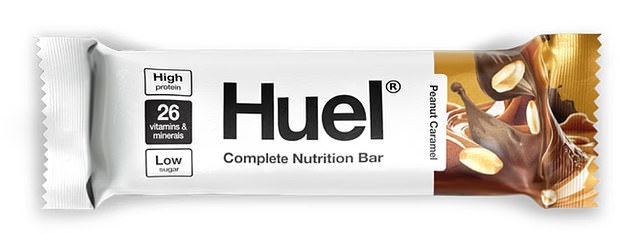
On the face of it, this bar seems to contain many of the nutrients you need in a healthy daily diet. However, this has a long ingredients list and contains highly processed ingredients including emulsifiers and the sweetener maltitol (which can cause digestive upsets if consumed in large amounts) – so you’d be better off nutritionally and will likely feel fuller for longer with a simple wholegrain sandwich filled with a lean protein such as chicken or hummus.
While this bar is fine as an occasional snack or meal replacement, a diet rich in minimally processed whole foods is the goal as they provide so much more than the nutrients you see on a label – from fibre variety needed for gut, heart, mental health and immunity; to protective plant compounds (phytonutrients) that support gut health.
2/10
Grenade Jaffa Quake
60g bar, £2.90, sainsburys.co.uk
Per 100g: calories, 340; saturated fat, 5.5g; protein, 35g; fibre, 4.2g; sugar, 2.4g; salt, 0.37g
Expert verdict: This large, 60g bar contains concentrated milk and whey proteins which provide an impressive 21g protein – equivalent to a small chicken breast and twice the protein you’ll find in many other bars.
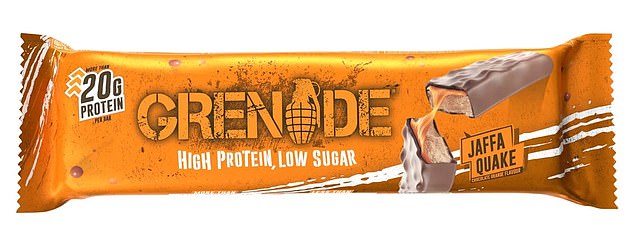
A snack or meal that supplies 20-30g of protein is considered optimal for muscle repair after resistance training, so this would be useful for that – or for anyone recovering from illness.
But there are a lot of additives here, too, which makes this an ultra-processed food (UPF) – diets high in UPFs are linked with higher risk of obesity, heart disease and type 2 diabetes, so products such as this should be eaten only occasionally rather than as a mainstay of your diet.
2/10
NAKD Protein Bar Cocoa Hazelnut
Three 45g bars, £2.35, tesco.com
Per 100g: calories, 424; saturated fat, 3.5g; protein, 16.1g; fibre, 15.4g; sugar, 25.2g; salt, 0.01g
Expert verdict: Each small 45g bar is made with just seven simple ingredients: dates, peanuts, chicory fibre, peanut flour, hazelnuts, cocoa powder and natural flavourings – so this is a far less processed option than many of the bars here.
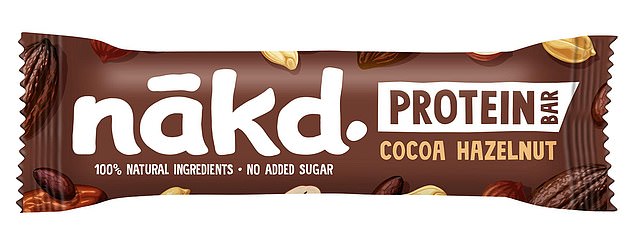
Dates, which make up a third of the ingredients, are a useful source of nutrients including copper, needed for immunity and energy. They also account for the almost 3tsp of sugar in this – but this is not something you should be too concerned about, as natural sugar from dried fruit comes with an abundance of healthy plant compounds and gut-friendly fibre.
You’ll only get 7.2g protein – mainly from peanuts and hazelnuts – which is the lowest of all the bars here. But combined with its 6.9g of fibre (around a quarter of your daily needs), this will be more filling and nutritious than a chocolate bar or packet of crisps.
7/10
Tribe Protein + Focus Choc Brownie
60g bar, £1.50, hollandandbarrett.com
Per 100g: calories, 388; saturated fat, 2.8g; protein, 17g; fibre, 11.7g; sugar, 16.1g; salt, 0.41g
Expert verdict: The high proportion of oats here provide around a quarter of your daily fibre per bar – but aside from oats and peanuts, there are a lot of highly processed ingredients such as syrups and emulsifiers that you wouldn’t find in your kitchen cupboard.
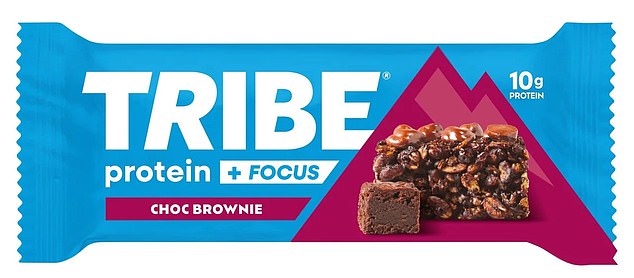
Some of the 10.2g protein in this bar – the equivalent of a large egg’s worth – comes from soya crispies (processed ‘puffs’ made from soya protein and tapioca starch).
There’s also 2tsp of sugar too – much of it coming from date and rice syrups and coconut sugar – which count as unhealthy ‘added’ sugars, linked to an increased risk of type 2 diabetes, obesity and tooth decay.
Most people with a balanced diet won’t need the additional B vitamins or magnesium you’d get in this bar. It also contains lion’s mane mushrooms, which are being researched for their potentially beneficial effects on brain health and focus – but this effect is noted in much higher doses than found here.
The added ginseng is thought to reduce fatigue and boost cognitive performance – but the evidence is mixed and the effects modest.
A cup of caffeinated coffee with wholemeal toast and nut butter is a better bet to boost alertness and refuel.
4/10
Pulsin Keto Bar Raspberry & Choc Chip
50g bar, £2, ocado.com
Per 100g: calories, 496; saturated fat, 12.2g; protein, 24.9g; fibre, 18.2g; sugar, 3.8g; salt, 0.57g
Expert verdict: Designed for people following a ketogenic – or very low carbohydrate diet – each 50g bar provides 12.4g protein and 9.1g fibre (almost a third of your daily needs), which should make it pretty filling.
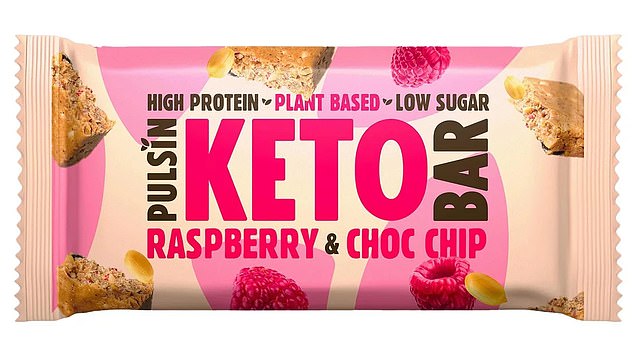
However, the fibre comes mostly from peanuts and processed ingredients, including soluble tapioca and chicory fibres. Processed fibre sources won’t give you the variety of nutrients and plant compounds that you’d get from whole foods.
This is low in sugar – but it’s sweetened instead with xylitol, a sugar alcohol that can cause bloating and diarrhoea if eaten in significant amounts.
It is also high in saturated fat – 6.1g, around a third of your daily limit – coming from cocoa butter and MCT oil, a concentrated form of fatty acids extracted from foods such as coconut oil. This is said to have the potential to help people on a ketogenic diet burn fat more efficiently.
But added saturated fats (including MCT oil) are unnecessary for the average person and may raise ‘bad’ cholesterol if consumed in excess.
3/10
H&B Triactive Super Good Bar Almond & Acai Berry
50g bar, £1.90, hollandandbarrett.com
Per 100g: calories, 521; saturated fat, 3.3g; protein, 18g; fibre, 14g; sugar, 22g; salt, 0.17g
Expert verdict: This has a simple ingredients list: the 57 per cent almond and peanut content here provides the bulk of the 8.8g protein (a large egg’s worth), as well as contributing to the filling 6.9g fibre in one bar (23 per cent of your recommended daily intake).
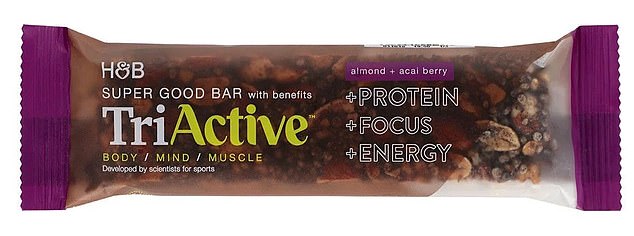
There are also dried cranberries, chicory root fibre, honey, puffed rice, and a tiny amount of vitamin C-rich acai powder in this – which makes me think it is there for marketing purposes rather than any nutritional benefit.
The added B vitamins and magnesium could be helpful if you are deficient but won’t give the immediate mood or energy boost as suggested by the marketing. The biggest factor for steady energy is having regular balanced meals throughout the day.
Much of the 11g sugar – almost 3tsps – will come from the fruit juice concentrate and honey, which both count as added sugar.
7/10
Kellogg’s High Protein Almond & Salted Caramel
Four 35g bars, £2.50, morrisons.com
Per 100g: calories, 494; saturated fat, 7g; protein, 26g; fibre, 3.4g; sugar, 24g; salt, 1.1g
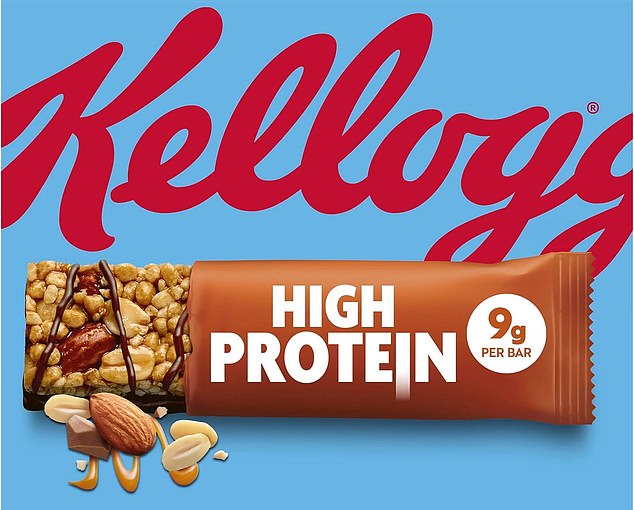
Expert verdict: This offers a reasonable amount of protein (9g) coming from roasted peanuts, soy protein pieces, skimmed milk powder, pea protein isolate (a concentrated plant protein), almonds, cashews and hazelnuts. Eating a variety of nuts is linked with better heart health and longevity.
But there’s just 1.2g fibre, or 4 per cent of your daily needs, in a bar so this is unlikely to keep you full for long.
The two teaspoons of sugar, which come from powdered milk but also a variety of processed, added sugar, alongside the emulsifiers and humectants here put the bar firmly in the ultra-processed category.
1/10
